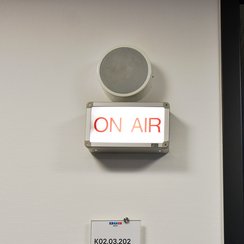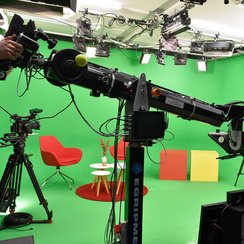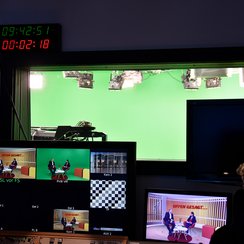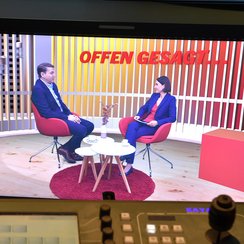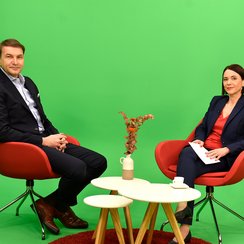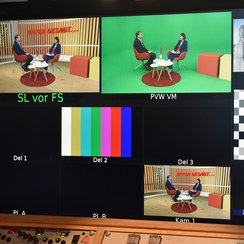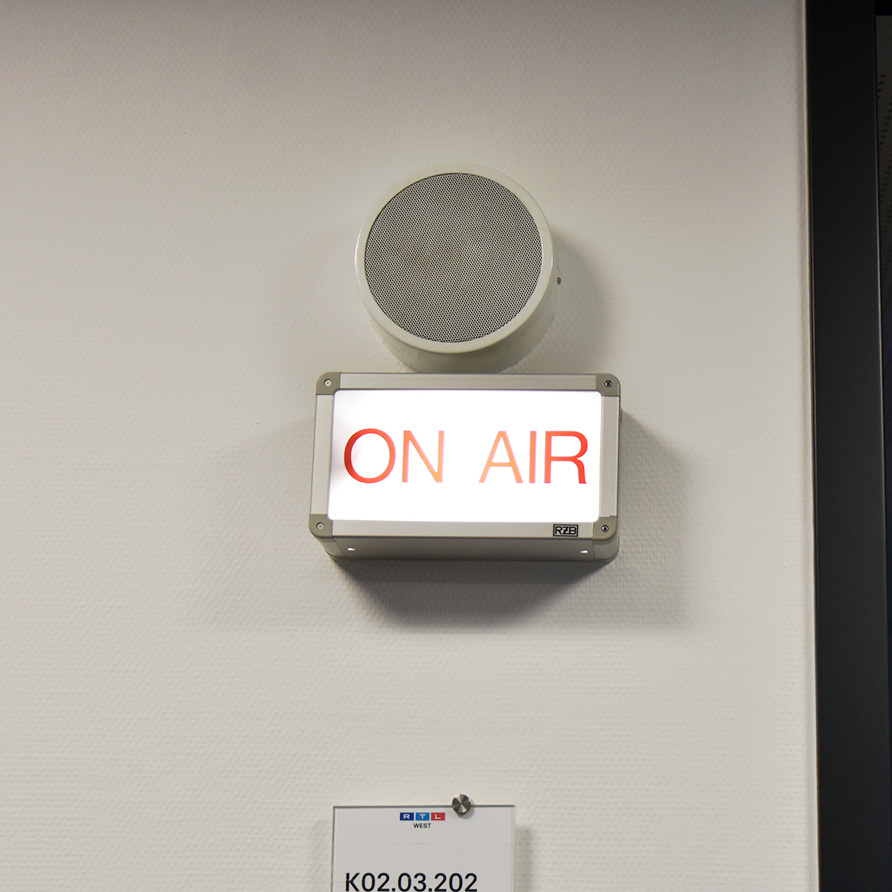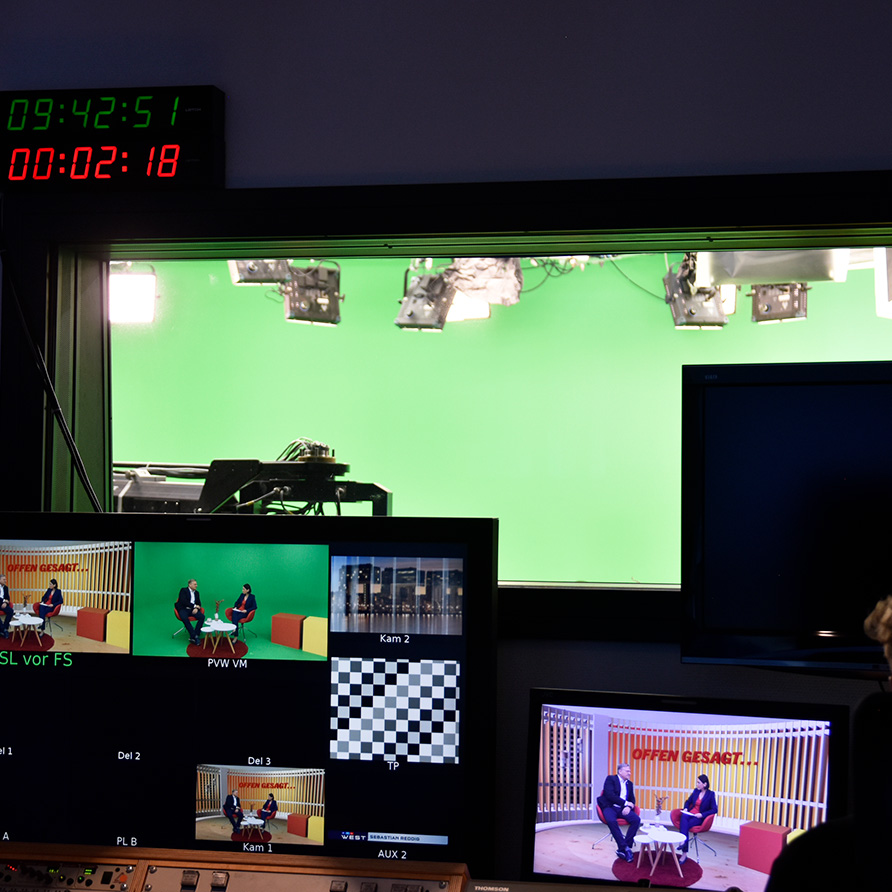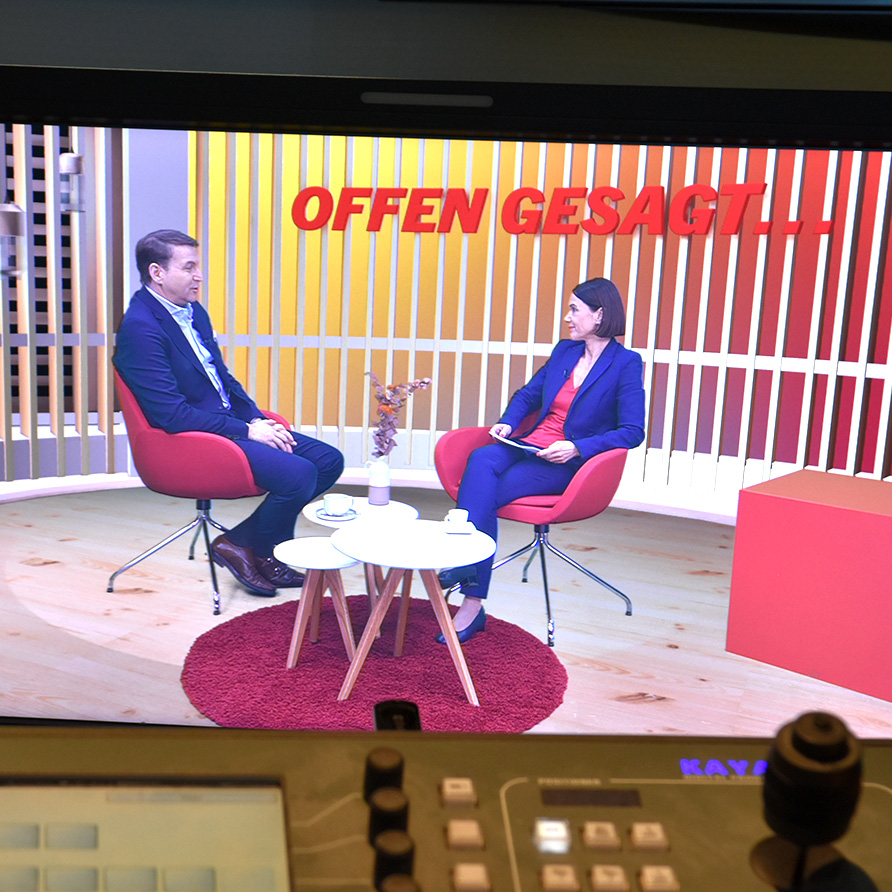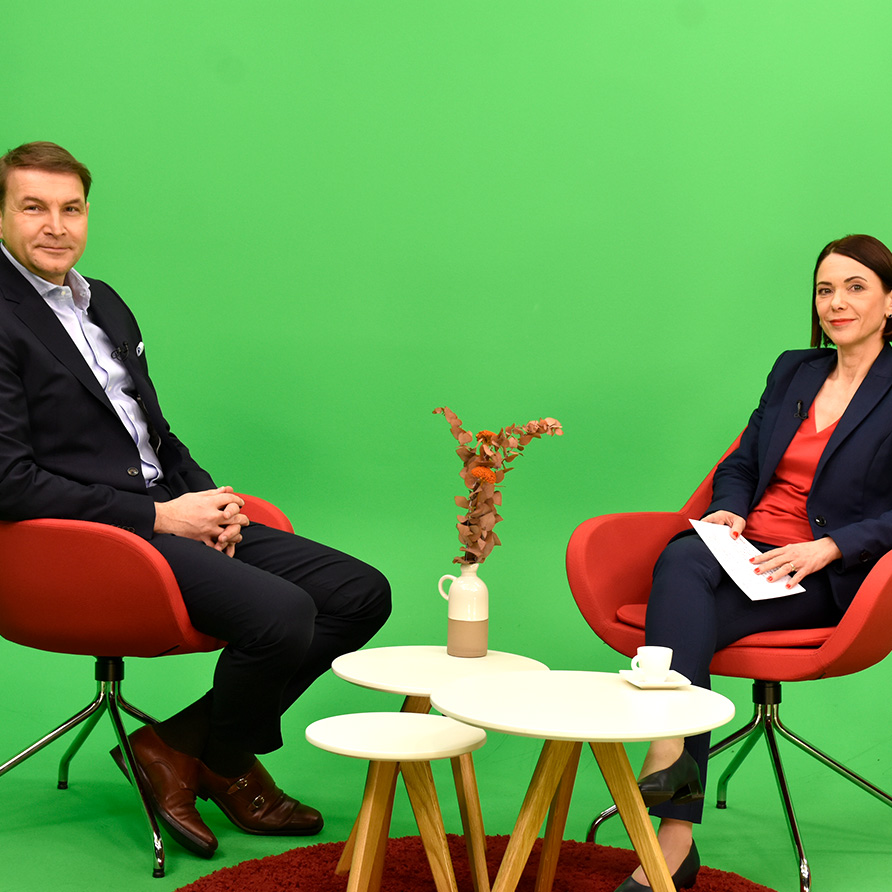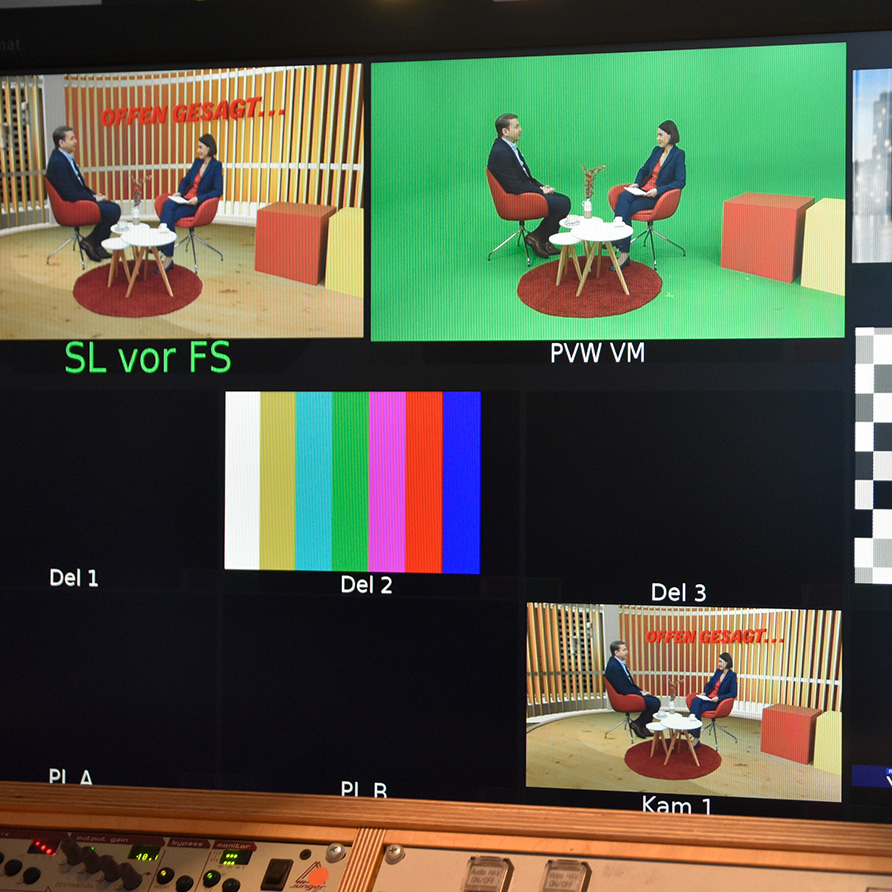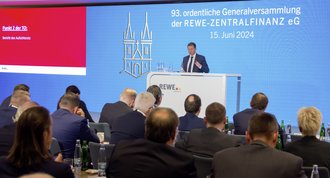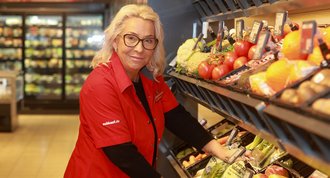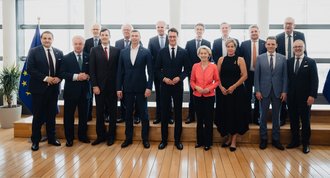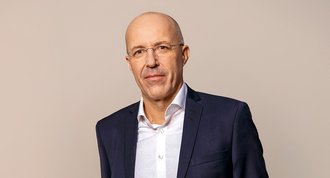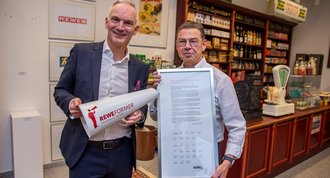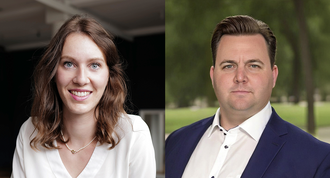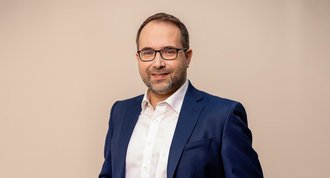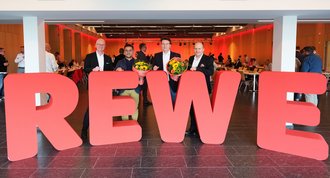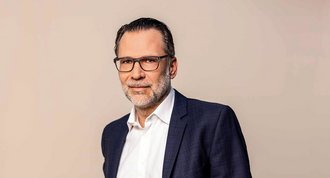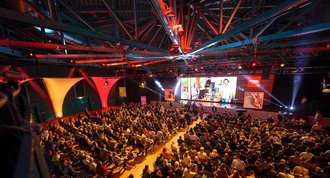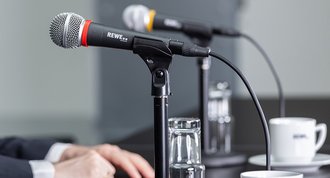Hans-Jürgen Moog joined the Management Board at the beginning of the year as the new member responsible for goods and purchasing. one spoke to him about taboos, customer wishes and the role that data plays in purchasing today.
one: Mr Moog, since the first of January, you and five colleagues have been the new REWE Group Management Board with Lionel Souque as CEO. Purchasing in particular, which you are now responsible for across the Group, has experienced challenging times over the past three years and it doesn't look like the situation is easing. How do you assess the situation against this backdrop?
Hans-Jürgen Moog : Everyone is talking about these issues, and a lot has already been said about them. Supply chains remain tense, price negotiations are challenging and high inflation is making everyday life more difficult than ever before. Fortunately, however, there are also increasing signs that the situation is easing: in the case of butter and coffee prices, for example. All in all, however, the tension remains high. During the coronavirus pandemic, everyone in the value chain really did pull together and try to overcome the crisis together. Now I have the impression that we are all in the same boat, but everyone is rowing in a different direction. We have absolutely no sympathy for that. And it doesn't make our work as a purchasing organisation any easier. Especially as - and this is really important to me - we want to continue to push forward with our strategic ambitions: We want to be a reliable partner for agriculture, reflect trends in our product range at an early stage, offer innovations, expand regionality, promote animal welfare and Sustainability, expand our own brands in a targeted and skilful way, offer top quality while providing the best value for money and much more. Of course, this requires an extremely efficient, courageous, resilient and powerful merchandise organisation for the entire REWE Group.
„We need to standardise what we can in order to become faster and more efficient and, above all, to create space and energy for the development of new things.“

one: How does your new function at Group level contribute to this?
Hans-Jürgen Moog : It's less about my role and more about the shared understanding across the Group of how we live and develop purchasing. We can now coordinate even better and strengthen our spirit. We agree on how we think about purchasing together, which strategies we use, which tactics we choose, how we can be both proactive and creative. You know, I don't like unambitious mediocrity or self-imposed bans on thinking. What we need instead is an honest will to create coupled with courage and consistent professionalism. In order to take this into account, i.e. to let go of old patterns and taboos, we need more dialogue and fresh ideas. We need to standardise what we can in order to become faster and more efficient and, above all, to create space and energy for the development of something new. With the strengthened Merchandise International Steering Committee (WIN Board), for example, we can now also coordinate even better internationally, learn more from other markets and then apply this jointly on a higher level or individually. Ultimately, in my role, I am committed to ensuring that we put our customers at the centre of everything we do and thus make the best purchases. In short, we provide the best service for customers, retailers and employees.
one: 'The customer at the centre' always sounds a bit like a buzzword, so what does this mean in concrete terms in purchasing, i.e. in everyday work?
Hans-Jürgen Moog: Well, the bottom line is that we start by thinking about everything from the customer's perspective. It's about questions like: What requirements do people have in their everyday lives, what lifestyle do they maintain, what do they value, what social attitudes are important to them. One example: With REWE, we are now the market leader in vegan and vegetarian food. We have often been ridiculed for this focus. However, the fact is that meat consumption has been declining for some time now and more and more people are eating at least partially vegan or vegetarian food. Given the importance of climate change on the list of major concerns, it can be assumed that more and more people will make this decision for themselves. We observed and understood this soon enough and decided to take action many years ago. Today, we are not just at the beginning; for us, this is already a positioning that strengthens our brand and reputation - and therefore also our business. We don't need to frantically market our first steps as a strategy, as we already have a broad range and a lot of expertise on the market. In contrast to others who are now trying to assert themselves in a hurry, we are building on many years of experience and established basic convictions. Of course, we can't just make decisions based on gut instinct or one-to-one discussions with neighbours and friends - there are facts and figures behind the decisions we make.
„We have to master the full range of market research, learn from all sources: understanding purchasing behaviour and international markets, making market visits, talking to retailers, engaging in personal dialogue and being able to read and interpret figures.“

one: There are a lot of myths surrounding purchasing - there are stories of tough tricks and nasty negotiations. What is the reality?
Hans-Jürgen Moog : Of course, it's a very focussed business, but that doesn't mean you can't do it in a spirit of partnership, reliability, commitment and style. Appreciation and respect are also included. At the end of the day, there are well-trained professionals working on both sides who pursue their respective strategic and tactical goals and negotiate them with each other. But of course, purchasing has also evolved and no longer corresponds to what is commonly imagined. We have to master the high keyboard of market research, learn from all sources: understanding buying behaviour and international markets, making market visits, talking to retailers, engaging in personal exchanges and being able to read and interpret figures and then translate this into the right product ranges, prices and so on. Ultimately, this means bringing these figures, data and information into optimal harmony with the means of digitalisation in order to work efficiently and achieve the highest possible hit rate in meeting customer needs - which brings us back to the basic principle of the customer.
one: What does digitalisation mean in purchasing? Looking around your office, I would say paperless working is part of it - what else?
Hans-Jürgen Moog : Ja! Natürlich, that's right, but not only because paper is not sustainable and takes up unnecessary space, but above all because it simply makes us more efficient, faster and more flexible. Above all, digitalisation helps us to fulfil the claim formulated above. In the old days in the corner shop, with its manageable range, you knew exactly what your regular customers' preferences were. They were then bought and offered. Today, with our much more diverse product range, we absolutely need data and people who can interpret this data correctly, recognise deviations and trends and translate these into the right strategies. As a senior manager, it is essential to make it clear that you work in the same way. In this respect, a paperless office has symbolic power. It always sets an example. If I expect modernity, openness and a driver mentality, then I have to live it myself - including staying power and perseverance.
one: How do you manage such a "new" purchasing organisation?
Hans-Jürgen Moog : Leadership has changed a lot in recent years - not only, but especially in purchasing. What has remained the same is that we have to deliver results and achieve our goals. But the way to achieve this is completely different today: we have to be faster, and that requires more proximity, approachability and transparency. We have to allow teams to lead themselves and we have to be there to advise and support them. That's why we have to think and practise leadership differently today. This is also a challenge for senior managers. It is easy to say, for example, that it is essential for a courageous organisation to have a good error culture. However, this also requires us to think differently, approach things differently, adapt attitudes and mindsets - both our own and those of our teams. This takes time, concentration and consistency. We want to promote talent and at the same time utilise the knowledge and experience of long-standing colleagues. To do this, we need to work together on our culture. Otherwise it won't work, you can't just decree it like that.
„For my colleagues, I'm no longer Mr Moog, but Hans-Jürgen. And we were pleasantly surprised by what this does to an organisation: it creates more proximity, of course, but it also makes us faster straight away.“

one: How can we imagine this in concrete terms? Do you have a specific example for us?
Hans-Jürgen Moog: For example, we received a suggestion from our junior staff programme for young employees - the Senior Excellence Programme - to introduce a "you culture". A few years ago, this would have been completely unthinkable in Purchasing. We took it on board, asked our employees - 80 per cent were in favour - and then immediately offered it to everyone. So for my colleagues, I am no longer Mr Moog, but Hans-Jürgen. And we were pleasantly surprised by what this does to an organisation: it naturally creates more proximity, that's obvious, but it also immediately makes us faster. So we have to constantly scrutinise ourselves on many points - even the very simple ones - in order to develop further. This is the only way we can achieve our goals.
Ultimately, it's about the results we achieve together. It is very important to me that we take a strategic and systematic approach to purchasing, have clear goals in mind and then consistently endeavour to achieve them. But it is equally important to me that we achieve this with a collegial and appreciative management style - with commitment in our statements. With closeness, openness, transparency and, above all, fun and enthusiasm for the common cause and the big picture.
one: Thank you very much for the interview.
Episode 3
"Frankly speaking" - the talk with the Management Board
In January, our newly formed Management Board took over the management of REWE Group in what continue to be turbulent times. Ines Schurin, Head of Corporate Communications, spoke to the Management Board members about their strategy, what it takes to work together and how we can remain competitive despite all the challenges in the new video format "Offen gesagt" over a hot drink of their choice.
And this is the last episode:
- 22. March Telerik Shishmanov, Management Board member for Finance
All previously published episodes of "Offen gesagt" are now available in the one_Mediathek.

